
At Wild Cherry Spoon Co., we love the planet and we try to be good to it when we can. That’s why we only use local, ethically harvested, sustainable urban lumber to create our products. That also means that when you purchase a Wild Cherry product, you’ve made an environmentally friendly choice, too! As a society, we need to make some big changes to counteract climate change. But on an individual level, sometimes the advice for living a greener life—like buying new, efficient appliances for the kitchen—is out of reach for those of us who rent or don’t have the budget. Still, there are also lots of small things we can do in the kitchen to use our powers for good and limit our impact on the planet. And hey, little things add up! Read on for some small things that can make a big impact on your kitchen’s environmental friendliness.
Reduce Single-Use Products

I recently tried to watch the infamous, disturbing, heartbreaking YouTube video of marine biologists removing a plastic straw from a sea turtle’s nasal passage. I stopped about two minutes into the eight-minute video, around the time the blood started flowing. (It didn’t feel right to link to a video I couldn’t get all the way through, but you can read about it here.) The sad truth is, our plastic waste is everywhere and it’s messing up animals’ lives. There are so many little kitchen throwaways that are easily replaced by reusable products. Metal straws, coffee thermoses, and lunch containers are just a few of the things you can pick up at our downtown Rock Island shop. Other great things to look for include beeswax food wraps, laminated bowl covers or silicone food covers, fabric grocery and produce bags, and glass water bottles.
Keep your fridge full
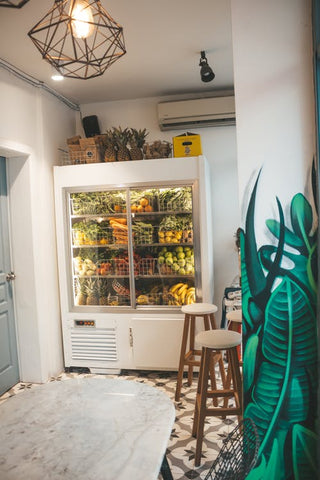
Believe it or not, an empty fridge uses more energy. That’s because having less air between each item makes it easier for the inside to stay cool. So, the more you have in your fridge, the more energy you save. Oh, and as an added benefit, that means you’ll save money on your electricity bill, too.
Use your microwave (or pressure cooker or crock pot)
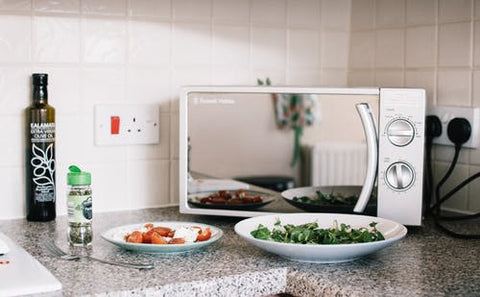
According to Energy Star, you can reduce cooking energy as much as 80% when using the microwave to cook or reheat small portions. This may not work for preparing dinner for a family of five—but a large crock pot or pressure cooker will, and these devices also use way less energy than a conventional oven. These time-saving gadgets are also better for the environment? Impatient cooks everywhere rejoice!
Cut down on food waste
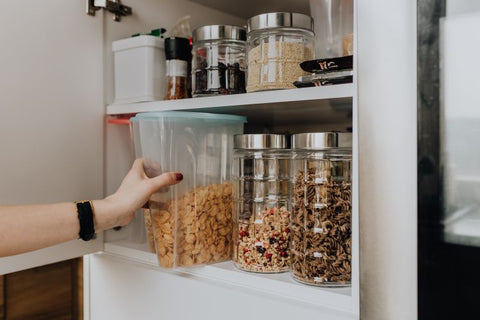
There are a lot of little strategies to help cut down on waste. Start by always putting together a list before grocery shopping to cut down on impulse buys. Avoid purchasing perishables in large amounts. Keep your pantry and fridge organized so you can see what you have and don’t end up buying things you don’t need. Once again, cutting down on food waste will also save you money at the cash register…I’m sensing a theme!
Use the right size pot or pan for the burner
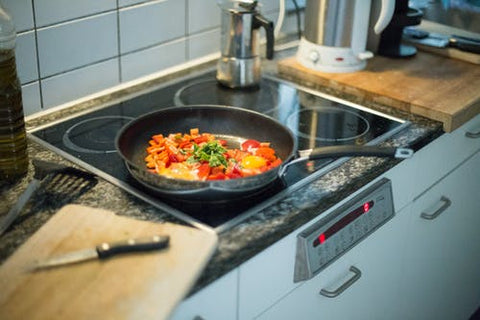
I was surprised to learn that a six-inch pot on an eight-inch burner wastes more than 40% of the burner’s heat. Impatient cook that I am, I always just assumed using a bigger burner was faster and therefore better. Consider me reformed! Keeping a lid on the pot also saves energy and decreases cook time, since less heat gets lost.
Use the dishwasher (wisely)
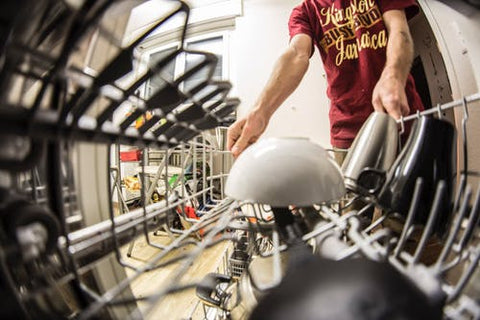
According to Recycle Nation, 140 liters of water are used on average washing by hand, compared to thirteen liters during a quick cycle in the dishwasher! Of course, dishwasher energy savings are highest when you run only full loads, and air dry instead of heat drying. If you don’t have a dishwasher, you can take steps to handwash dishes more sustainably. Try scraping dishes into the trash or compost bin rather than pre-rinsing them. If you don’t have a double sink, a dish tub will help you wash up without keeping the water running the whole time.
Buy products that last
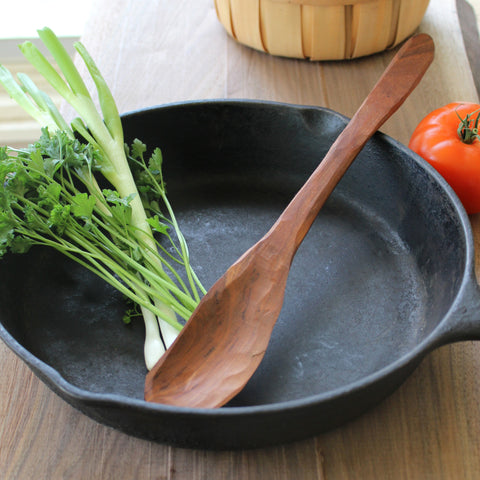
Go for the highest-quality products you can afford. High-quality wood and metal tools will last a long time with proper care, while low-quality wood may rot, and—let’s face it—plastic cooking utensils are fated to melt practically right away. Cast-iron and stainless-steel cookware lasts longer than non-stick coated pans. The longer your tools last, the more stuff you save from going into the landfill, and that’s not all you’ll save! (You guessed it—in the long run, you’ll also save money!)
Sources: Energy StarThe New York Times
Thrillist
TreeHugger
